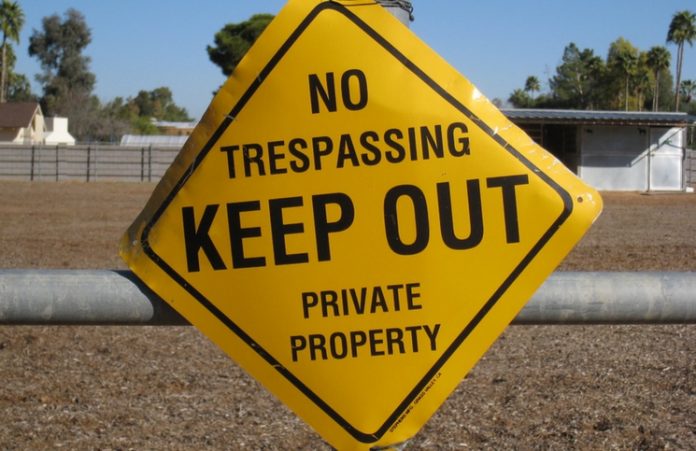In this blog post, Pravesh Naveriya from RDVV, Jabalpur, talks about your legal option if someone trespass or encroaches upon your property.
What if you went out for a month and after coming back from your vacations you found that someone else is living in your house? Or you own a plot in the adjoining town and when you went to see your plot after a long time, you discover that a slum has been developed in your plot? Or you being an NRI have come to India after a long time and you realize that your flat has been occupied by someone else and he is refusing to leave? Then what should be done?
This is the question which runs through the mind of a person. A person facing such problems shall contact the police immediately as he has become a victim of encroachment or trespass of land.
What is Encroachment
- Encroachment is an act in which a property is either used or interrupted by someone, who doesn’t have any right over that property.
- An encroachment may be either on a private land or on a government land.
- An encroachment on a private land is not an offence in itself but a remedy is available against it under law of torts.
- The remedy for encroachment over a private property is the same as for the trespass of land.
What is Trespass
Trespass is an offence which is defined in both the Indian Penal Code as well as in the law of torts. Trespass in legal terms is the physical interference of an unauthorized person into either a land or chattel or body of the aggrieved person. Trespass in simple words can be explained as, disturbing a person or even entering into a person’s property, by an unauthorised person, without or against his or her consent. This is a problem which is usually faced by the people who have more than one property.
- Non- Residential Indians are the ones who face this problem the most.
- They buy Indian property just for investment purposes and then visit that land in years, this gives the trespassers the perfect opportunity to use that property for their own use.
- Trespass are of three types, trespass of person, trespass of chattel and trespass of land or property.
- Trespass of person is an act in which a person without any authority or the consent of the aggrieved person, disturbs or intervenes the person from doing what he was doing before he was interrupted.Trespass of person has been explained in the law of torts.
- Trespass of chattel is an act in which a person without any authority or the consent of the aggrieved person, disturbs or intervenes with the privately owned movable property of the person. Trespass of chattel has been explained in the law of torts.
- Trespass of property or land is an act in which a person without any authority or the consent of the aggrieved person, disturbs or intervenes with the property or land of a person. Trespass of land has been explained in the law of torts as well as in the Indian Penal Code. It is a punishable offence.

There are certain components which are essential for any interference to become trespass. The basic components which are essential for trespass of property are:
- Entry into someone else’s property. The first component for trespass is entering into the property of someone else. Merely a statement or declaration that he will enter into the property shall not constitute trespass. For a case of trespass to be registered a physical trespass has to happen.
- Taking the entry without consent or against his consent. If any person takes an entry into a property where he has not been allowed to enter, specifically or generally, then he is said to commit trespass.
- Entry by an unauthorised person. If any person who was not authorised to take an entry into the property, makes an entry into the land possessed by someone else, then he shall be liable for trespass. If any person who either has been authorised by that person or by the law enters into the property in the due course when he has been authorised shall not be liable for trespass. For example, if a Police Officer or a CBI Officer or an Income Tax Officer enters a property to perform certain act which he has been assigned, shall not be held liable for trespass.
Criminal Trespass
- Trespass of property of a person without his consent, by another person without authority, has been defined as criminal trespass under Section 441 of the Indian Penal Code, 1860.
- As per the section, if any unauthorised person enters upon the property of another person, without his consent then he shall be punished for criminal trespass.
- The punishment of criminal trespass has been defined in Section 447 of the Indian Penal Code.
- If a stranger has trespassed upon your property then, he shall be liable for punishment under criminal trespass.
- The punishment for criminal trespass is imprisonment which may extend to 3 months or fine which may extent to 500 rupees or both.
- Cognizable
- Bailable
- Compoundable
- Finable up to 500 rupees
- Imprisonment which may extend to 3 months.
House Trespass
- Criminal trespass upon the backyard or any other part of the property which is in someone else’s possession is called house trespass.
- House trespass is a more precise term as compared to criminal trespass.
- Criminal trespass is intervention upon any property which is not under your possession whereas house trespass is the criminal trespass of someone’s house or any portion of his house.
- Every house trespass is criminal trespass but every criminal trespass is not house trespass.
- House trespass has been defined in Section 442 of the Indian Penal Code and the punishment for house has been defined in Section 448 of the code.
- The punishment for house trespass is imprisonment for a term which may extend to one year or fine which may extend to 1000 rupees or both.
- Cognizable
- Bailable
- Compoundable
- Finable up to 1000 rupees
- Imprisonment which may extend to 1 year.
Remedies Available
The first move you should make if anyone trespasses or encroaches upon your property is try to stop him from doing it.
- The law gives each and person a power and a right to protect your property by using appropriate measures.
- Sections 103 and 104 of the Indian Penal Code allows a person to cause grievous hurt or even kill a person in order to protect your property.
- But these powers shall only be used when it becomes necessary to use it.
- If a person causes grievous hurt or kill a person while protecting his property and he has used it in a situation under which he was justified to do it, he shall not be punished for killing or for causing grievous hurt to that person as he has not committed any offence because what he did will be covered under private defence.
- The remedies which are available to you if anyone trespasses or encroaches upon your property are to get an injunction order for stopping that person from making any encroachment or trespassing upon your property, and you can also claim for the damages which you have suffered due to that encroachment or trespass.
Injunction
Injunction is the order which is passed by a court to either stop or restrain the defendant from either starting or stopping to do something. In other words, an injunction is the order of a court which demands a person to either perform an act or refrain from doing an act. Injunctions are broadly divided into two types, temporary and permanent.
Permanent and Temporary Injunction
- A permanent injunction is passed as the final order restricting the defendant from doing any act.
- A temporary injunction is an injunction which is passed by the court to make sure no further act is done related to that property or work temporarily.
- If a stranger trespasses or encroaches upon the property of a person, then he can approach the court and file an application under Order 39 Rule 1 and 2 of the Code of Civil Procedure to get an order of temporary injunction.
- The court after examining the application will ask the defendants to file their reply on the case. The court after examining their reply may either reject the application or accept it.
- If the court has accepted the application then it shall make an order of temporary injunction, ordering the respondent to stop the construction work on that particular property.
Ex-parte Injunction
It is a general rule that no order shall be passed without hearing both the parties or in other words it is compulsory that both the parties are given appropriate opportunity of being heard before any order is passed. But there are certain exceptional cases in which a leave is given to this rule. One of the exceptions is an ex-parte injunction order.
- An ex-parte injunction order is an order of injunction which is passed by the court without hearing both the parties.
- If a stranger trespasses or encroaches upon the property of a person, then he may approach the court and file an application for temporary injunction under order 39 rule 1 and 2 of the Code of Civil Procedure.
- In case the defendants are not replying, or the applicant feels that by the time the reply shall come, he will bear a huge loss, and if the court is also satisfied with his contention, then the court may pass an ex-parte injunction order under order 39 rule 3 of the Code of Civil Procedure.
- It happens very rarely and the burden of proof is upon the applicant to prove that his case comes under the definition of exception provided under the law.
Damages
Damages are a means through which a person is supposed to get approximately what he has lost. There are certain injuries for which no damage or compensation can give what is lost but on the other hand, there are certain injuries for which an amount of money can compensate the loss. One of those acts are trespass and encroachment.
- If someone trespasses or encroaches upon the property owned by you then you may approach the court and ask for the damages which you have suffered.
- Damages, in other words, is the compensation which the court asks the defendant to give to the plaintiff for the loss which he has suffered.
- If a stranger has trespassed or encroached any part of your property, then he is liable to compensate you in the form of damages.
- The amount of damage depends upon the loss which you have suffered. Damages are given for both physical as well as mental losses suffered.
- The amount of physical loss is usually calculated by calculating the present value of the land upon which you have suffered the loss.
- Calculating a mental loss is a more complex matter, for this the court has to go through the case thoroughly as see that the loss is of what impact and then decide an amount to be paid as damages.
Conclusion
If anyone encroaches or trespasses upon your property then, first of all, you already have certain rights regarding the protection of your property. You may also approach the court for an injunction order under Order 39 rule 1, 2 and 3 and can claim his damages under the law of torts.
What are your views on this? Feel free to comment below & share the article.
LawSikho has created a telegram group for exchanging legal knowledge, referrals and various opportunities. You can click on this link and join:
https://t.me/joinchat/J_
 Serato DJ Crack 2025Serato DJ PRO Crack
Serato DJ Crack 2025Serato DJ PRO Crack









 Allow notifications
Allow notifications



Hi ,
I am akash and i am living in jaipur.
My problem is someone have made his house on my land and we are unable to do anything as he have given some money to some nigam officers Such that we are unable to do anything . Then we sue against him but he is not showing his house document to court . Nigam officers came and go everytime as he call someone then they all go . Its about 2 years . We are not able to do anything as every person is offered money by him and they go. We have 2 doors for our house enterence and he have covered our second door from water tank . From which we are unable to open our second door . We tried to remove once but he purchased new one and kept it over there. We are unable to do anything. The land he owns is not more than 50% of what he covers. He is covering government land also . What we can do ?
hi…
thanks for sharing valuable information. My father near to retirement , presently residing in a government accommodation. But he is having a flat in rohini, in the name of my mother. From the last 6 months a person with his family is residing, without our knowledge and trespassed our property. Upon asking they told that they had bought this flat onlease for 5 years on payment of 7 lacs. Which is complete shock to my family. What should we do now. We had already filed the complaint 1 month before in the police station. They are saying they are doing their work and investigating. But nothing came out concrete. What should we do now.
I want to do boundary of personal property in law and order.
[…] For more information on trespass and how to deal with trespassers over your property, click here. […]
Sir ,
I’m a Defense serving personal
Permanent Residence: LALTAROAD MAU CHITRAKOT UP 210209
My residencial plot at KARWI PAHI CHITRAKOT on the name of my widow grandmother . Science my father damised and taking advantage of my personal absence my residencial plot be encroached forcible by My adjecent personal
I’ve registered complain on jansunavai & anti bhu mafiya
The report uploaded signed by lekhpal approved by SDM that as per my deed no extra land available on the same gata no all are accupaid.so u have to take passassion by Court . Is there any government procedure to get passassion out of court proceedings bcoz court proceedings take long time
It is requested to provide necessary advoic for restoration of my possession on my property